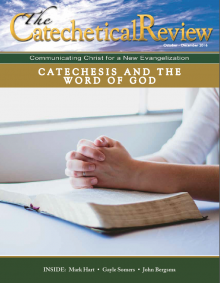
God is love.
Not only is it true that God loves, but God IS love. Through all of eternity and all of time, God is pure self-gift, which is true love’s essence.
From infinite love, God created so that human beings could live in this love and know the joy that comes from total self-donation. When they chose instead the way of grasping, the way of self-assertion, reaching out to take for themselves what was offered as gift, they fell from love.
With God, nothing is—in time—irreversibly lost. Divine Love initiated a plan to redeem us, to heal us of our great self-inflicted wound. This plan would reach its apex in an act that would reveal his luminous Mystery for all to see. In the fullness of time, God sent his Son, Love Incarnate. From the very beginning of his earthly life, embracing the poverty of human experience, “he emptied himself, taking the form of a slave, coming in human likeness; and found human in appearance, he humbled himself, becoming obedient to death, even death on a cross” (Phil 2:7-8).
The story of salvation we study in the Bible is the revelation of Supreme Love. Such love, such total renunciation of self, such willing of the good of the other for the other’s sake, should not put us at ease. It ought not lull us to sleep. It demands everything of us. It wrenches us out of our selfishness—from seeing ourselves as the center—and always at great cost we are to turn ourselves towards others. We make this turn because we remember: “I have given you a model to follow, so that as I have done for you, you should also do” (Jn 13:15). For the one who wishes to be responsive to Christ’s great command to “love one another as I have loved you” (Jn 15:12), to embrace the very purpose of life, there is this consolation: He said, “I am with you always” (Mt 28:20).
He is with us in his Word. The Word of God is, above all, a revealing of God by God. This self-revelation comes through a medium we are able to receive: human language. The incarnational way, the way of God making himself “receivable” to us, is undertaken out of love, as John of the Cross writes: “In perfect love, this law holds: that the lover becomes like the one he loves.”[1] God reveals himself under the appearance of human words so that we might be conformed to his Mystery, to the self-sacrificing love of God, crucified for our supreme good. Blessed Columba Marmion asks, “Why did Christ leave us so many divine teachings? Why did the Holy Spirit inspire the sacred writers to note down so many details, sometimes insignificant ones?” He answers, “it was so that we might scrutinize the Mystery of Christ, contemplate his person, study his actions: those actions of his reveal to us his virtues and his will.” To what purpose do we undertake such a study? “We ought to contemplate him so as to conform our lives to this model who makes God accessible to us, so as to draw on him for divine life, in order that our thirst be fully quenched.”[2]
Christ is, however, not merely our model for how to live, for he said, “I am the way, the truth and the life” (Jn 14:6). Christ is our “life” when his life becomes our own. From him we received natural life at the moment of our conception and from him we receive his own supernatural, divine life. In both cases, everything changes for us!
He is with us in the divine life he gives. We are conformed to the Mystery of Divine Love, not by our own strength but because Christ remains with us through sacramental grace—the very life of God. The Lord uses the extraordinary image of the vine and the branches to describe this intimate communion. Blessed Columba comments, “what closer union is there than that, since it is the same sap, the same life, that circulates in the root and in the vine-shoots?”[3]
Christ’s self-emptying love is best experienced in the treasury of his Word and in his life-giving sacraments. Both make the divine Mystery accessible to us. Pondering the Mystery through his Word, being plunged into the Mystery through the waters of Baptism, and receiving the Mystery as our daily sustenance in Holy Communion empower us to bring this world what it most desperately needs: the self-emptying love of the Blessed Trinity.
Dr. James Pauley is Associate Professor of Theology and Catechetics at Franciscan University of Steubenville.
This article originally appears on page 5 of the printed edition.
Notes
[1] The Collected Works of St. John of the Cross, trans. Kieran Kavanaugh, OCD and Otilio Rodriguez, OCD (Washington DC: ICS Publications, 1991), 66.
[2] Blessed Columba Marmion, Christ in His Mysteries (Bethesda, MD: Zaccheus Press, 2008), 9.
[3] Ibid., 19.
This article is from The Catechetical Review (Online Edition ISSN 2379-6324) and may be copied for catechetical purposes only. It may not be reprinted in another published work without the permission of The Catechetical Review by contacting [email protected]


















